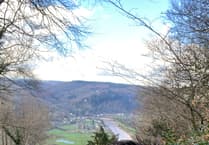RECENT planning applications for large solar PV (photovoltaic) farms illustrate exactly why we need a renewable energy strategy for the Forest that supports good schemes and a local planning policy which requires big developers to offer real local benefits.
Solar PV is a highly effective technology and the UK needs more of it. Solar farms are cost-effective to build and maintain and can also be designed to encourage biodiversity and allow grazing.
They can represent appropriate, good development but, like any big development, it's important to look at the nature of the scheme proposed and weigh the benefits against the impacts.
The proposal for a 16MW (megawatt) PV farm at Nibley Farm off the A48 is one in a series of applications proposed by companies external to the Forest (in this case the UK arm of a German company) looking to capitalise on our renewable energy resource while giving practically nothing back to the local area.
With 79,000 panels covering nearly 38 hectares this represents a major renewable energy development for the Forest – yet pretty much all the money from it will flow outside the district.
The community fund proposed of £3,000-£10,000 per year is way below what the developer could afford to offer and out of line with national benchmarks for major schemes. (The industry's own trade body Renewables UK advises £5,000 per installed MW for large-scale wind schemes as a minimum guideline. The income per MW for solar farms is less than wind but even taking this into account an equivalent community payment should be closer to £30,000 per year).
The farmer will benefit from a land rent but other than that there will be little or no local jobs created from the manufacture, installation or running of the PV farm and no local investment opportunity.
There are numerous examples of wind schemes and solar farms around the UK that offer much more local benefit e.g. from local manufacture and construction, a larger community grant pot, raising a local share issue or even models where the council or community groups have part or full ownership.
In Denmark large renewable energy schemes automatically offer the community an investment stake (e.g. 20 per cent).
Renewable energy is an essential and growing part of our energy system and we should be welcoming new schemes – including wind or PV farms.
But they need to be right for the Forest and we shouldn't let ourselves be exploited. It's our sun and wind after all.
– Janine Michael, Dean Community Energy Group.



